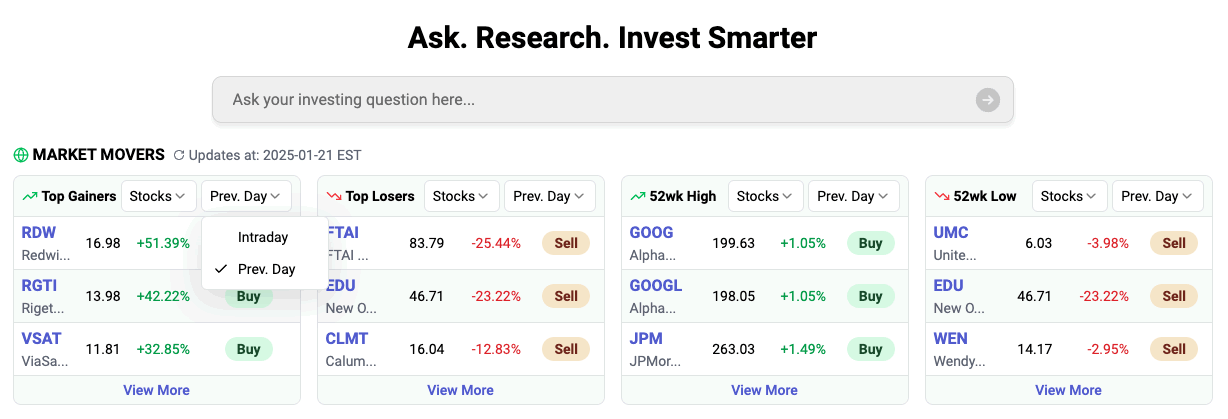MarketLens
What are the key factors I should consider when analyzing stock trends using language-based data?
Dec 01, 2023
SHARE THIS ON:
Analyzing stock trends using language-based data involves a multifaceted approach,
considering various key factors:
- Sentiment Analysis: This involves evaluating the sentiment in news articles, social media posts, and financial reports. Positive sentiment often correlates with rising stock prices, while negative sentiment can signal declines. This analysis requires sophisticated natural language processing (NLP) algorithms to accurately gauge sentiment from text.
- Volume of Mentions: The frequency with which a stock or company is mentioned in various media can be an indicator of public interest or concern. A sudden increase in mentions might precede market movements.
- Source Credibility: Different sources have varying levels of credibility. Official financial reports, reputable news agencies, and verified social media accounts might provide more reliable information than unverified sources.
- Contextual Analysis: The context in which a stock or company is mentioned is crucial. For instance, a company being mentioned in the context of a scandal may have a different impact than being mentioned for a breakthrough innovation.
- Historical Data Correlation: Correlating language-based data with historical stock trends can help in predicting future movements. If certain language patterns have historically been followed by specific stock behaviors, these patterns can be used for predictive analysis.
- Economic Indicators and Industry Trends: Language-based data should be analyzed in the context of broader economic indicators and industry-specific trends. For instance, positive news about a tech company should be weighed against overall tech industry trends.
- Real-Time Analysis: The stock market is highly dynamic, and real-time analysis of language data can provide timely insights. Delayed analysis might result in missed opportunities or misinterpretations.
- Natural Language Processing Techniques: The complexity of language means that sophisticated NLP techniques are necessary. This includes understanding idioms, sarcasm, and complex sentence structures that a simple keyword-based analysis might miss.
- Market Sentiment Indicators: Beyond individual stocks, language-based data can also give insights into the overall market sentiment, which can affect individual stocks.
- Regulatory and Legal Information: Discussions about regulatory changes, legal challenges, or government policies can significantly impact stock prices. This information often requires careful analysis as it can be complex and jargon-laden.
- Algorithmic Trading Influences: Be aware that in today’s markets, algorithmic trading systems also analyze language-based data and can react faster than human traders. Understanding their impact is crucial.
- Diversity of Data Sources: Relying on a wide range of sources, from news articles and financial reports to social media chatter, can provide a more comprehensive view of stock trends.
- Bias and Noise Filtering: It’s important to filter out noise and bias in language data, as they can lead to inaccurate conclusions.
- Integration with Quantitative Data: Combining language-based analysis with traditional quantitative stock analysis can provide a more holistic view.
Remember, while language-based data can provide valuable insights, it’s one part of a larger puzzle in stock analysis. Combining this approach with other forms of analysis and considering the broader economic and sector-specific context is essential for informed decision-making.
To become a better investor with our AI Assistant @ kavout.com/investgpt
SHARE THIS ON:
Disclaimer: The information provided here and on kavout.com site is for general informational purposes only. It does not constitute investment advice, financial advice, trading advice, or any other sort of advice. Kavout does not recommend that any investment decision be made based on this information. You are solely responsible for your own investment decisions. Please conduct your own research and consult with qualified financial advisors before making any investment. Kavout and its partners are participants in a number of affiliate advertising programs. As an Amazon Associate, Kavout or its partners earn from qualifying purchases from affiliate links. We also participate in other affiliate and advertising programs that provide a means for us to earn advertising fees by advertising and linking to third-party websites.
Featured Articles
category
RELATED ARTICLES
Early Release of AI-Powered Stock Pick Feature: Unlocking Investment Opportunities with Natural Language
Mar 31, 2024
Introducing InvestGPT: Actionable Insights & Analysis for Investors via Natural Language
May 04, 2024


